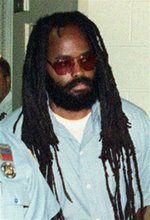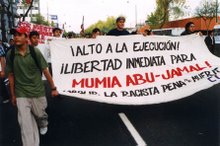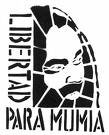
El Olvidado Martín Luther King
Mumía Abú-Jamal
15/01/09
El Reverendo Doctor Martín Luther King, Jr. está siendo otra vez
resucitado en estos días del año, en parte porque se acerca su
cumpleaños, pero también, naturalmente, por la imminente
juramentación del Presidente electo Barack H. Obama --
el primer Negro en la historia de los Estados Unidos
de ser así honrado.
Como casi siempre pasa, el Reverendo King que hoy es presentado se
parece muy poco al hombre real, lleno de vida, que respiraba, crecía y que se
encuentra detrás del nombre.
Como todo hombre, él tuvo sus altos y sus bajos, sus miedos y sus dudas,
sus inspiraciones y sus revelaciones. Su discurso en Washington (conocido
como, "Yo Sueño que un Día") no fué ni su mejor discurso, ni el más profundo,
pero, como todos los predicadores Negros que son buenos oradores, él puso en
ese discurso lo mejor de sí.
El Doctor King, como muchos líderes muy ocupados, tenía otros que le
escribían algunos de sus discursos, y uno de ellos fué Vincent Harding, hoy
teólogo e historiador. Harding contribuyó al extraordinario discurso que el
Doctor King pronunció en la Iglesia Riverside, de la ciudad de Nueva York,
pronunciado precisamente un año antes de su asesinato. En ese discurso el Doctor
King denunció la Guerra de Viet-Nam, que marcó su ruptura con el presidente
norteamericano, Lyndon B. Johnson, con las corporaciones de los medios de
comunicación y con muchos de sus más cercanos aliados en la Conferencia de Líderes
Cristianos del Sur,(Southern Christian Leadership Conference , SCLC.)
El Pesidente Johnson se sintió traicionado por el Doctor King, y los
medios de comunicación cambiaron de elogios a ridículo. En su libro, Martín
Luther King: El Héroe Inoportuno (Martin Luther King: The Inconvenient Hero, New
York, Orbis, 1996), Harding cita la página editorial del Washington Post que
ataca a King, quien, "ha disminuído su utilidad a su causa, a su país y a su
pueblo" debido a su discurso contra la Guerra de Viet-Nam, a la que los
vietnamitas llamaban, "La Guerra Norteamericana".
Pero, las traiciones no lo detuvieron, ni lo desalentaron los malos
editoriales. En verdad, la violencia de la guerra lo radicalizó profundamente,
tanto así que el diría después, "lo perverso del capitalismo es tan real como
son perversos el militarismo y el racismo." (Harding, 101).
Piense en ésto: capitalismo, militarismo y racismo -- son perversos.
¿Cuándo es la última vez que Usted ha escuchado éso?
El Reverendo Doctor Martin Luther King, Jr. estaba siendo radicalizado
por los agitados acontecimientos que pasaban alrededor suyo -- y, un año antes
de su muerte, él estaba tanto contra la guerra como contra el capitalismo.
Pregúntese Usted, si el Dr. King estuviera vivo hoy, con sus opiniones,
¿podría ser elegido presidente?
Y si no, ¿porqué no?
¿Qué dice éso del sistema político de la nación?
--(c) '09 maj
Traducción libre del inglés
--------------------------------------------------------------------------------------
The Forgotten Martin Luther King
[col. writ. 1/15/09] '09 Mumia Abu-Jamal
The Rev. Dr. Martin Luther King, Jr. is once again being resurrected
this time of year, in part because his birthday is approaching, but also, of
course, because of the imminent swearing-in of President-elect Barack H. Obama
-- the first Black man in U.S. history to be so honored.
As often is the case, the Rev. King who is being projected today bears
little relationship to the real, live, breathing and growing man behind the
name.
Like many men, he had his highs and his lows, his fears and his doubts,
his inspirations and his insights. His Washington speech (known as "I Have a
Dream") was neither his finest, nor his most profound, but like many Black
preachers who are master orators, he brought his best to it.
King, like many busy leaders, had others write some of his speeches, and
one of those men was Vincent Harding, now a theologian and historian.
Harding contributed to Kings' groundbreaking N.Y. Riverside Church speech,
delivered precisely a year before his assassination (where he denounced the Vietnam
War), marking his break with an American president (L. B. Johnson), the
corporate media, and many of his closest allies in the SCLC (Southern Christian
Leadership Conference.)
President Johnson felt betrayed by King, and the media turned from
praise to ridicule. In his book, Martin Luther King: The Inconvenient Hero (N.
Y.:Orbis, 1996), Harding quotes from the Washington Post editorial page which
slammed King, who "had diminished his usefulness to his cause, to his country,
and to his people" because of his speech against the Vietnam War (which the
Vietnamese called, 'the American War')
But betrayals didn't stop him, nor did nasty editorials deter him.
Indeed, the violence of war radicalized him deeply, so much so that he said
later, "the evils of capitalism are as real as the evils of militarism and evils
of racism" (Harding, 101).
Think of that: capitalism, militarism, and racism -- as evils.
When's the last time you've heard that?
Rev. Dr. Martin Luther King, Jr. was being radicalized by the churning
events around him -- and, a year before his death, he was both anti-war and
anti-capitalist.
Ask yourself, if King were alive today, with his views, could he be
elected president?
If not, why not?
What does that say about the nation's political system?
--(c) '09 maj









No hay comentarios:
Publicar un comentario